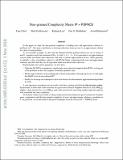Fine-grained complexity meets IP = PSPACE
Author(s)
Chen, Lijie; Goldwasser, Shafrira
DownloadSubmitted version (565.6Kb)
Open Access Policy
Open Access Policy
Creative Commons Attribution-Noncommercial-Share Alike
Terms of use
Metadata
Show full item recordAbstract
In this paper we study the fine-grained complexity of finding exact and approximate solutions to problems in P. Our main contribution is showing reductions from an exact to an approximate solution for a host of such problems. As one (notable) example, we show that the Closest-LCS-Pair problem (Given two sets of strings A and B, compute exactly the maximum LCS(a, b) with (a, b) ∈ A × B) is equivalent to its approximation version (under near-linear time reductions, and with a constant approximation factor). More generally, we identify a class of problems, which we call BP-Pair-Class, comprising both exact and approximate solutions, and show that they are all equivalent under near-linear time reductions. Exploring this class and its properties, we also show: • Under the NC-SETH assumption (a significantly more relaxed assumption than SETH), solving any of the problems in this class requires essentially quadratic time. • Modest improvements on the running time of known algorithms (shaving log factors) would imply that NEXP is not in non-uniform NC1. • Finally, we leverage our techniques to show new barriers for deterministic approximation algorithms for LCS. A very important consequence of our results is that they continue to hold in the data structure setting. In particular, it shows that a data structure for approximate Nearest Neighbor Search for LCS (NNSLCS) implies a data structure for exact NNSLCS and a data structure for answering regular expression queries with essentially the same complexity. At the heart of these new results is a deep connection between interactive proof systems for bounded-space computations and the fine-grained complexity of exact and approximate solutions to problems in P. In particular, our results build on the proof techniques from the classical IP = PSPACE result.
Date issued
2019-01Department
Massachusetts Institute of Technology. Department of Electrical Engineering and Computer ScienceJournal
Proceedings of the Annual ACM-SIAM Symposium on Discrete Algorithms
Publisher
Society for Industrial and Applied Mathematics
Citation
Chen, Lijie et al. “Fine-grained complexity meets IP = PSPACE.” Paper in the Proceedings of the 2019 Annual ACM-SIAM Symposium on Discrete Algorithms, San Diego, CA, January 6-9 2019, Society for Industrial and Applied Mathematics: ix + 2972 © 2019 The Author(s)
Version: Original manuscript
ISSN
1071-9040